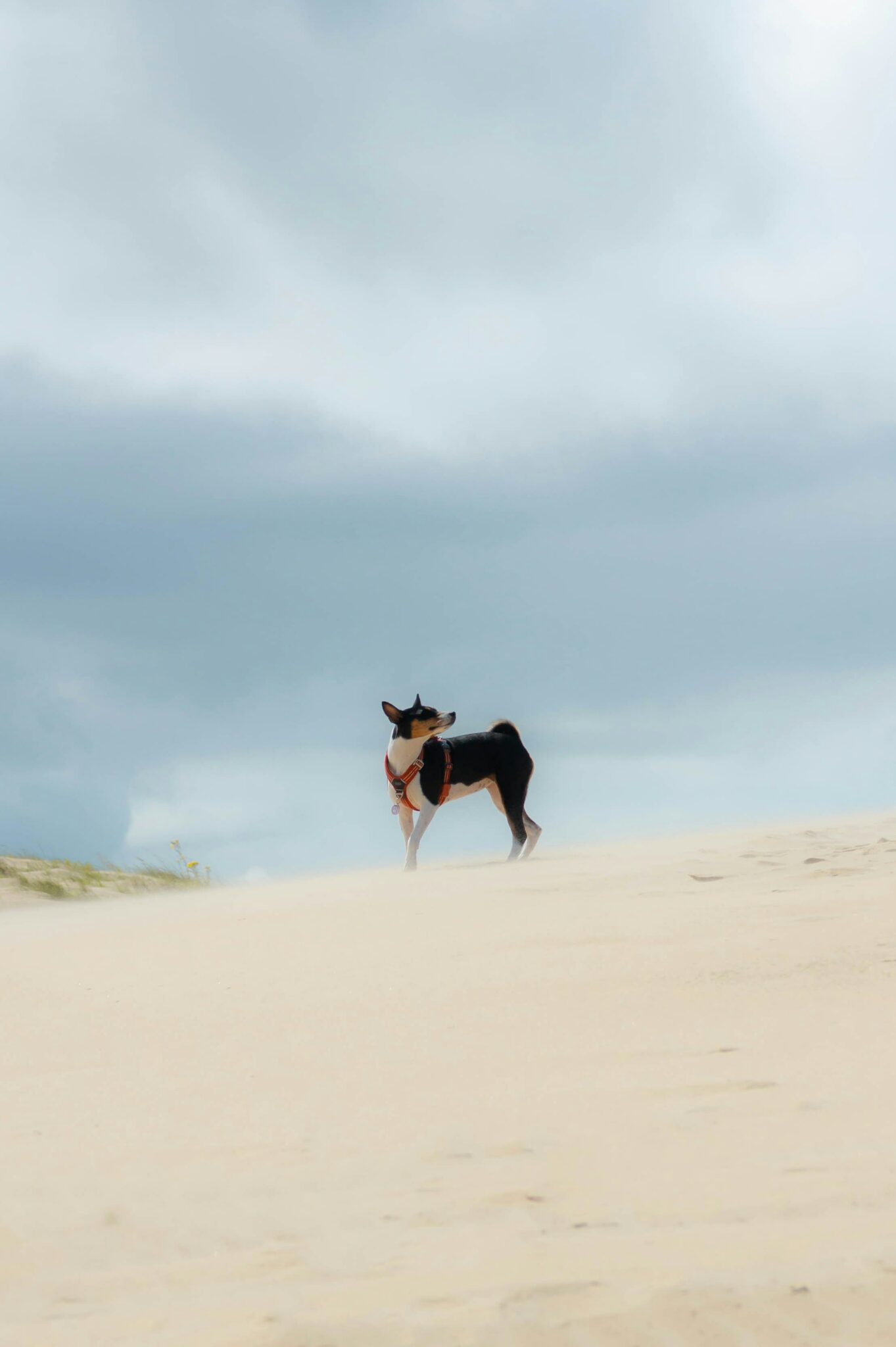Introduction
The Basenji dog, known for its unique traits and history, has captivated dog lovers around the world. This breed, often referred to as the "barkless dog," hails from Africa and has a fascinating lineage that dates back centuries. Originally bred for hunting purposes, the Basenji is a small to medium-sized dog with distinctive features that set it apart from other breeds.
Exploring the history and origins of the Basenji provides valuable insights into the cultural significance of these dogs in various African societies. The breed's survival and adaptation over the years offer a glimpse into the resilience and versatility of this ancient breed. Understanding the roots of the Basenji sheds light on its temperament, behavior, and unique characteristics that make it a cherished companion for many families.
From their hunting skills to their distinctive yodel-like vocalization, Basenjis have a rich history that deserves to be celebrated and explored. By delving into the origins of this remarkable breed, we can appreciate the heritage and legacy that these dogs carry through generations. Join us on a journey as we unravel the captivating history of the Basenji dog, a breed that continues to enchant and delight dog enthusiasts worldwide.
Ancient Origins of the Basenji
The Basenji breed is believed to have ancient origins, tracing back to Africa thousands of years ago. Historical evidence suggests that these dogs have been revered companions to African hunters and gatherers for centuries, known for their intelligence and agility in tracking game in the dense African forests. The Basenji's distinct physical features and hunting abilities have made them valuable assets to various tribes in the Congo region.
These dogs, also known as the "Barkless Dog," are thought to have earned this name due to their unique larynx structure that limits their ability to bark like other canines. Instead of barking, Basenjis are known for their distinctive yodel-like sound, a trait that sets them apart from other dog breeds. This unique vocalization is believed to have been an advantageous feature for hunters, as it allowed them to work silently without alerting prey.
Throughout history, Basenjis were highly valued for their hunting prowess and loyal companionship. Their relevance in African society is evident through ancient artifacts and artwork depicting these dogs alongside their human counterparts. The Basenji's lineage can be traced back through generations, with their bloodline remaining relatively pure due to their isolation in Africa before being introduced to other parts of the world in modern times.
Basenjis in African Culture
Basenjis have deep roots in African culture, particularly in regions such as the Congo, where they originated. These dogs are often referred to as the "barkless dogs" due to their unique trait of rarely barking. Instead, they make an unusual yodel-like sound, which has made them stand out among other breeds.
In African societies, Basenjis have been highly valued for their hunting abilities and companionship. They were used by native tribes to assist in hunting small game, thanks to their agility, speed, and intelligence. Basenjis were also known for their independent nature, making them resilient and resourceful in the African wilderness.
Historically, Basenjis were considered sacred by some African tribes, with special rituals and ceremonies performed to honor these dogs. Their sleek appearance, keen senses, and loyalty made them not just hunting partners but also revered animals within the community, often depicted in various forms of African art and folklore.
Today, Basenjis continue to hold significance in African culture as well as worldwide, captivating dog enthusiasts with their unique traits and rich history. Their presence in African societies has left a lasting legacy, showcasing the strong bond between humans and dogs that transcends time and borders.
Arrival in the Western World
Upon arrival in the Western world, the Basenji dog captivated enthusiasts with its unique characteristics and ancient lineage. Initially discovered in Central Africa, the breed's introduction to Western countries sparked curiosity and intrigue among dog fanciers and breeders alike. With its distinct appearance and remarkable hunting abilities, the Basenji quickly gained a following in various parts of the world.
As the breed became more prominent in Western societies, efforts were made to preserve its genetic heritage and maintain its original traits. Breed standards were established to ensure that the Basenji retained its authentic characteristics and continued to showcase its hunting prowess. This marked a significant moment in the history of the Basenji dog, as it transitioned from its traditional role in Africa to a beloved companion and show dog in the Western world.
Despite its newfound popularity in Western countries, the Basenji dog still carries with it a sense of mystery and intrigue stemming from its ancient origins. Its arrival in the Western world not only brought attention to the breed's unique qualities but also shed light on the importance of preserving its heritage for future generations to appreciate and admire.
Challenges and Preservation Efforts
One challenge faced by the Basenji dog breed is its small gene pool. Due to its limited genetic diversity, there is an increased risk of inherited health issues among Basenjis. This can lead to various conditions that may affect the overall well-being of the breed.
Another challenge is the preservation of the Basenji's unique traits and characteristics. As a hunting dog with ancient African roots, maintaining the breed's original instincts and abilities requires dedicated efforts. Ensuring that these traits are not lost or diluted through breeding practices is essential for preserving the Basenji's distinct heritage.
To address these challenges, various preservation efforts have been established within the Basenji community. These initiatives include genetic testing programs aimed at identifying and managing hereditary health concerns. Additionally, breeders work to promote responsible breeding practices that prioritize the preservation of the Basenji's natural qualities.
Furthermore, education plays a vital role in the conservation of the Basenji breed. By raising awareness about the history and unique characteristics of Basenjis, enthusiasts and breeders help ensure that future generations understand and appreciate this remarkable dog breed. Through collaboration and commitment, the Basenji community continues to strive towards preserving the breed for years to come.
Modern-Day Basenji Characteristics and Traits
Modern-day Basenjis still exhibit many of the characteristics that have defined the breed for centuries. They are known for their intelligence, curiosity, and independence. Despite being a small to medium-sized breed, Basenjis are athletic and agile dogs with a keen sense of smell. Their elegant and poised demeanor often gives them an aloof or cat-like attitude towards strangers.
Basenjis are renowned for their unique trait of not barking like other dogs but instead emitting a distinctive yodel-like sound or "barroo." This feature, along with their fastidious grooming habits and lack of doggy odor due to their self-cleaning nature, sets them apart from many other dog breeds. Their short coat, which comes in various color combinations, requires minimal maintenance, making them popular among owners who prefer low-maintenance pets.
Although Basenjis are affectionate and loyal to their families, they can also be strong-willed and have a stubborn streak. This independent nature can make them a challenge to train for inexperienced dog owners. Basenjis are a high-energy breed and require regular exercise to channel their energy positively. Without adequate physical and mental stimulation, they can become bored and engage in destructive behavior.
Basenji's Unique Traits: the Barkless Dog
The Basenji dog stands out for its unique trait of being a barkless breed. This distinct characteristic sets them apart from most other dog breeds known for their vocalizations. Instead of barking, Basenjis are known for making yodel-like sounds and howls. This trait makes them intriguing and different from typical canine companions.
The origin of the Basenji's barkless nature can be traced back to their hunting background in Africa. Their quiet demeanor was a valuable trait during hunting expeditions as it prevented alerting prey to their presence. This adaptability and silence in the hunt have been preserved through generations, making the Basenji a truly unique breed in the canine world.
Despite their lack of barking, Basenjis are excellent watchdogs and will alert their owners to any potential intruders with their distinctive vocalizations. This blend of silence and alertness makes them an ideal choice for those seeking a companion that is both reserved and protective. The Basenji's barkless nature is not a sign of shyness but rather a conscious choice to communicate in a different, yet effective, manner.
Popular Culture Depictions of Basenjis
Popular Culture Depictions of Basenjis showcase the breed in various forms of media, providing insight into how these unique dogs have captured the attention of audiences worldwide. In movies, Basenjis have been featured for their distinctive bark, lack of doggy odor, and graceful demeanor. Cartoon and animated series have also included Basenjis in their storylines, often highlighting their independent nature and hunting skills.
Television shows and commercials have utilized Basenjis to portray qualities such as intelligence, agility, and loyalty. These depictions have contributed to the breed's portrayal as both a charming companion and a skilled hunter. The presence of Basenjis in popular culture reflects their versatility and appeal to a wide range of audiences.
From classic films to modern-day advertisements, Basenjis have found a place in popular culture due to their unique characteristics and storied history. Their inclusion in various forms of media has brought attention to the breed's ancient origins and enduring charm, helping to familiarize audiences with this distinctive and fascinating breed.
Basenjis as Family Pets
Basenjis make wonderful family pets due to their loving and loyal nature. Despite being independent, they form strong bonds with their owners and are known to be affectionate companions. Their small to medium size makes them suitable for various living situations, whether in a spacious home or a cozy apartment.
As a part of the family, Basenjis thrive on human interaction and enjoy being involved in everyday activities. Their intelligent and curious nature means they are quick learners and can adapt well to training if done with patience and positive reinforcement. This breed also tends to be clean and grooms itself similar to a cat, making them relatively low-maintenance.
It's important to note that Basenjis have a strong prey drive, so early socialization with other pets is crucial. Additionally, their energetic nature requires regular exercise to keep them happy and healthy. Family activities that include mental stimulation and physical exercise, such as interactive games and long walks, are ideal for this lively breed.
Conclusion: The Timeless Appeal of the Basenji
The Basenji dog's unique history and origins contribute to its timeless appeal as a breed. Originally from Africa, this ancient dog breed is known for its intelligence, agility, and distinct features. The Basenji's sleek appearance and independent nature have captivated dog lovers for generations.
Despite being one of the oldest breeds in existence, the Basenji remains a popular choice for modern dog owners. Its ability to adapt to various environments and its loyal demeanor make it a beloved companion for many families. The Basenji's curious and playful personality adds to its charm, endearing it to both new and experienced dog owners.
Through centuries of evolution and careful breeding, the Basenji has maintained its distinctive characteristics, making it a standout breed in the dog world. Its clean habits, unique vocalizations, and strong hunting instincts harken back to its roots as a hunting companion in Africa. The Basenji's enduring qualities continue to make it a cherished breed among dog enthusiasts worldwide.






